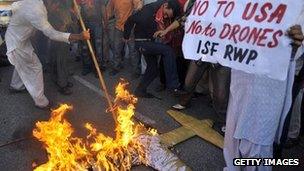Drones in Pakistan traumatise civilians, US report says
- Published

The drone attacks have provoked widespread anger in Pakistan
Civilians are being "terrorised" 24 hours a day by CIA drone attacks that target mainly low-level militants in north-west Pakistan, a US report says.
Rescuers treating the casualties are also being killed and wounded by follow-up strikes, says the report by Stanford and New York Universities., external
Drone attacks are thought to have killed hundreds of militants in Yemen and Afghanistan as well as Pakistan.
US President Obama has said the targets are "on a list of active terrorists".
Senior al-Qaeda and Taliban leaders have been killed in drone strikes in Pakistan.
But the scale of civilian casualties has been difficult to assess because independent media and researchers are denied access by the authorities to the tribal areas near the Afghan border.
Hours before the report was released, another drone strike hit the Mir Ali area of North Waziristan. The Pakistani Taliban said nine fighters were killed.
CIA-led
In one of the most notorious attacks of recent years, tribal elders and local traders were among more than 40 people killed when two drones attacked a car carrying at least four militants at Datta Khel in North Waziristan in March 2011.
In June this year, a senior al-Qaeda leader, Abu Yahya al-Libi, was killed in a drone strike.
That attack prompted UN Human Rights Commissioner Navi Pillay to question the legality of a practice that was "outside the military chain of command".
A controversial aspect of the US policy is that drone attacks are carried out not by the military but by the Central Intelligence Agency. Pakistan is not a zone of armed conflict, unlike neighbouring Afghanistan.
US Defence Secretary Leon Panetta has defended the policy, saying that the US will continue to defend itself.
Earlier this year President Barack Obama insisted the strategy was "kept on a very tight leash" and that without the drones, the US would have had to resort to "more intrusive military action".
An Associated Press investigation on the ground in Pakistan found that a significant majority of those killed by the drones were combatants. The report, by Stanford University and New York University's School of Law, upholds that conclusion, adding that the vast majority of those targeted were low-level militants and not senior commanders.
It says top commanders only account for an estimated 2% of drone victims.
The report also details hundreds of civilian casualties and the effects of drone strikes on the local population. It cites data from the Bureau of Investigative Journalism estimating that between 474 and 881 civilians have been killed in strikes between 2004 and 2012.
"In the United States, the dominant narrative about the use of drones in Pakistan is of a surgically precise and effective tool that makes the US safer by enabling 'targeted killings' of terrorists, with minimal downsides or collateral impacts. This narrative is false," according to the report, Living Under Drones.
"Publicly available evidence that the strikes have made the US safer overall is ambiguous at best," it says, adding that targeted killings and drone attacks undermine respect for international law.
The report says that the US government rarely acknowledges civilian casualties, though there is significant evidence that civilians are being injured and killed.
Intelligence-sharing
The report highlights the impact of drone attacks on civilians in Pakistan's tribal regions. Citing "extensive interviews with the local population", the authors say:
children are being taken out of school out of fear of a drone-strike or to compensate for income lost from a dead or wounded relative
there is "significant evidence" of the practice of "double-tap" strikes in which rescuers arriving at the scene are targeted in follow-up attacks
drones flying overhead have led to "substantial levels of fear and stress... in the civilian communities"
as well as injury or death, the attacks cause property damage, severe economic hardship and emotional trauma for the injured and their families
people are afraid to attend gatherings such as funerals for fear of attack
One humanitarian worker - previously based in the US - compared the levels of fear in Waziristan to those in New York after the 9/11 attacks.
London-based human rights group Reprieve, which commissioned the report, said it was taking legal action in an attempt to force the UK government to clarify its policy of sharing intelligence in support of the CIA's drone-strikes.
Reprieve said it was acting on behalf of Noor Khan, whose father was one of the victims of the March 2011 attack at Datta Khel.
- Published31 January 2012
- Published30 May 2012
- Published6 June 2012
- Published6 June 2012